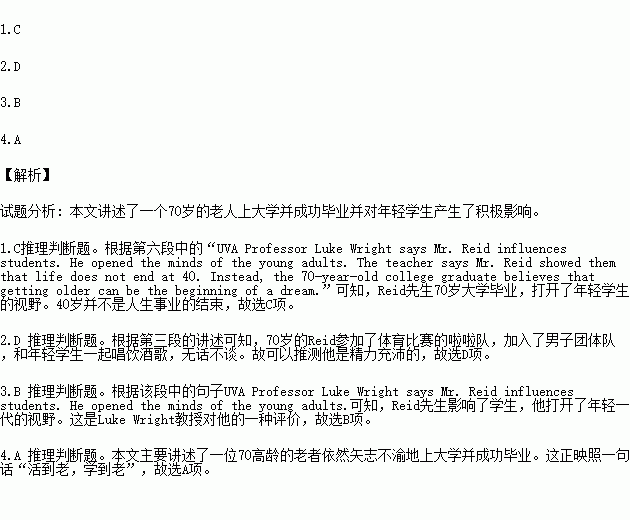题目内容
Many schools across the US hold graduation ceremonies this time of year. In some schools, even 5 and 6-year-olds observe their graduation from kindergarten. And so can older people, much older. Meet 70-year-old Jerry Reid, who just graduated from the University of Virginia in Charlottesville. He earned a bachelor’s degree.
Mr. Reid might not look like the average college student; his hair is definitely grayer. But still Jerry Reid’s age is easy to forget, other UVA students know him as one of their own.
Mr. Reid sat into the “Hoo Crew,” a group that cheers loudly for the school at sports events. He also joined a men's group on campus. He sang drinking songs along with many other students. Mr. Reid’s school friends say they can talk to him just about anything.
About a half century ago, in his 20s, Mr. Reid was not in school. Instead, he was racing cars and chasing girls. But he says his friend Bill invited him to UVA parties.
“Bill told me what a terrible life I had unless I came up here and went to school with him,” said Reid.
That was in 1963. Jerry Reid says it took him 48 years to take that advice. In 2011, he entered college. UVA Professor Luke Wright says Mr. Reid influences students. He opened the minds of the young adults. The teacher says Mr. Reid showed them that life does not end at 40. Instead, the 70-year-old college graduate believes that getting older can be the beginning of a dream.
“Remember that path that you left waits for you. It’s there. It’s yours. All you must do is to get out of your own way and get back to it. And, that's exactly what I did,” said Reid.
Mr. Reid says that he and his wife Susan now would take some time off to enjoy his college degree. Then, he’ll return to UVA to begin studying for his graduate degree.
1.Which of the following is true of Mr. Reid?
A. He was laughed at by other students.
B. He was interested in study in his youth.
C. He enlarged the views of young people.
D. He got his graduate degree in 2011.
2.From the third paragraph, we can infer that Mr. Reid was _________.
A. considerateB. independentC. intelligentD. energetic
3.What does Paragraph 6 mainly discuss?
A. How Mr. Reid realizes his dream.
B. What teachers think of Mr. Reid.
C. When Mr. Reid entered college.
D. Why the students likes Mr. Reid.
4.What lesson can we learn from the story of Jerry Reid?
A. It is never too late to learn.
B. Two heads are better than one.
C. Actions speak louder than words.
D. A friend in need is a friend indeed.
 优学名师名题系列答案
优学名师名题系列答案| A. | have been troubling | B. | troubled | ||
| C. | had troubled | D. | was troubling |
Another interesting experiment showed a bird's (6)amazing number sense.A man was trying to take a photo of a crow (乌鸦) that had a nest in a tower,but the crow always left when she saw him coming.The bird did not (7)return until the man left the tower.The man had an (8)idea.He took another man with him to the tower.One man left and the other stayed,but they did not(9)fool the bird.The crow stayed away until the second man left,too.The experiment was (10)repeated with three men and then with four men.But the crow did not return to the nest until all the men were (11)gone.It was not until five men went into the tower and only four left that they were (12)finally able to fool the crow.
How good is a human's number sense?It's not very good.For example,babies about fourteen months old almost always notice if something is taken away from a(13)small group.But when the number goes beyond three or four,the children are (14)often fooled.
It seems that number sense is something we have in common with many animals in this world,and that our human (15)ability is not much better than a crow's.
| 1.A.rise | B.pattern | C.change | D.trend |
| 2.A.Importantly | B.Surprisingly | C.Disappointedly | D.Fortunately |
| 3.A.survive | B.care | C.hatch | D.notice |
| 4.A.generally | B.sincerely | C.casually | D.deliberately |
| 5.A.distance | B.range | C.difference | D.interval |
| 6.A.amazing | B.annoying | C.satisfying | D.disturbing |
| 7.A.relax | B.recover | C.react | D.return |
| 8.A.appointment | B.excuse | C.idea | D.explanation |
| 9.A.fool | B.hurt | C.catch | D.kill |
| 10.A.reported | B.repeated | C.designed | D.approved |
| 11.A.confused | B.gone | C.tired | D.drunk |
| 12.A.gradually | B.luckily | C.strangely | D.finally |
| 13.A.single | B.small | C.local | D.new |
| 14.A.seldom | B.temporarily | C.merely | D.often |
| 15.A.sight | B.nature | C.ability | D.belief. |
-_______.( )
| A. | Extra Large | B. | 50 each | ||
| C. | It sells well | D. | Altogether there are 5 |
Several years ago I (37)receiveda letter from seventeen-year-old Kerry,who described herself as a world-class fault-finder,almost always (38)bothered by things.People were always doing things that annoyed her,and (39)surprisingwas ever good enough.She was highly self-critical and also found fault with her friends.She became a really (40)boring person.
Unfortunately,it took a horrible accident to change her (41)attitudeHer best friend was seriously hurt in a car crash.What made it almost (42)unnecessary to deal with was that the day before the (43)accident,Kerry had visited her friend and had spent the whole time criticizing her (44)choice of boyfriends,the way she was living,the way she related to her mother,and various other things she felt she needed to (45)express It wasn't until her friend was badly hurt that Kerry became (46)awareof her habit of finding fault.Very quickly,she learned to appreciate life rather than to(47)judge everything so harshly (刻薄).She was able to transfer her new wisdom to other parts of her(48)lifeas well.
Perhaps most of us aren't as extreme at fault-finding,(49)but when we're honest,we can be sharply (50)critical of the world.I'm not suggesting you (51)ignoreproblems,or that you pretend things are (52)betterthan they are,but simply that you learn to allow things to be as they are-(53)atleast most of the time,and especially when it's not a really big (54)deal.
Train yourself to"bite your tongue",and with a little(55)practice,you'll get really good at letting things go.And when you do,you'll get back your enthusiasm and love for life.
| 36.A.lonely | B.great | C.quiet | D.uneasy |
| 37.A.received | B.answered | C.expected | D.rejected |
| 38.A.threatened | B.interrupted | C.bothered | D.spoiled |
| 39.A.anything | B.everything | C.something | D.nothing |
| 40.A.caring | B.boring | C.interesting | D.surprising |
| 41.A.attitude | B.plan | C.measure | D.explanation |
| 42.A.urgent | B.unnecessary | C.certain | D.impossible |
| 43.A.occasion | B.event | C.accident | D.adventure |
| 44.A.memory | B.notice | C.evidence | D.choice |
| 45.A.hear | B.contribute | C.express | D.admit |
| 46.A.aware of | B.afraid of | C.curious about | D.confused about |
| 47.A.discuss | B.realize | C.judge | D.settle |
| 48.A.family | B.life | C.career | D.education |
| 49.A.so | B.or | C.but | D.for |
| 50.A.proud | B.sure | C.hopeful | D.critical |
| 51.A.face | B.create | C.solve | D.ignore |
| 52.A.rarer | B.better | C.stranger | D.worse |
| 53.A.at least | B.at last | C.by far | D.so far |
| 54.A.task | B.deal | C.result | D.duty |
| 55.A.practice | B.speech | C.rest | D.pity. |

